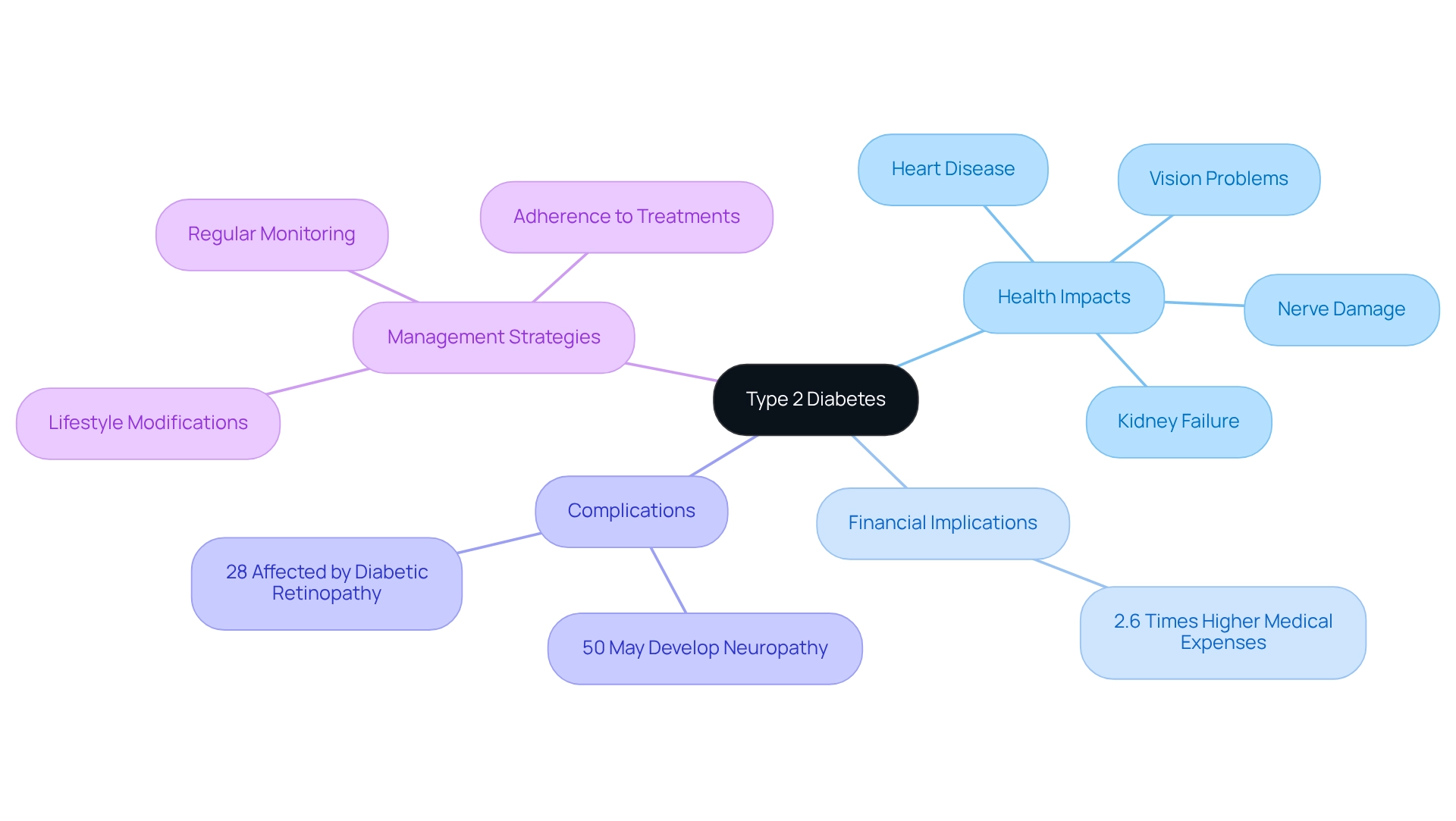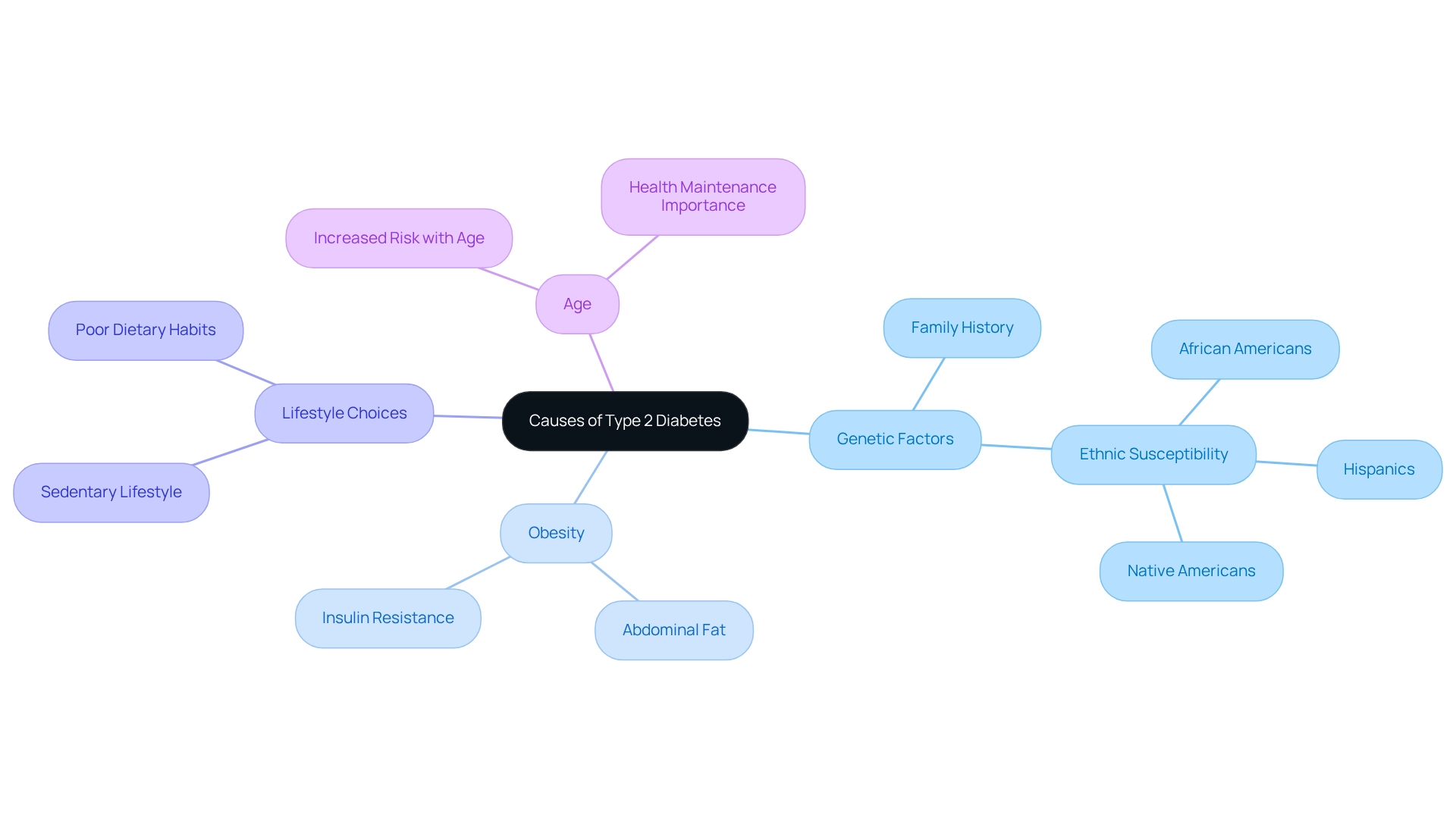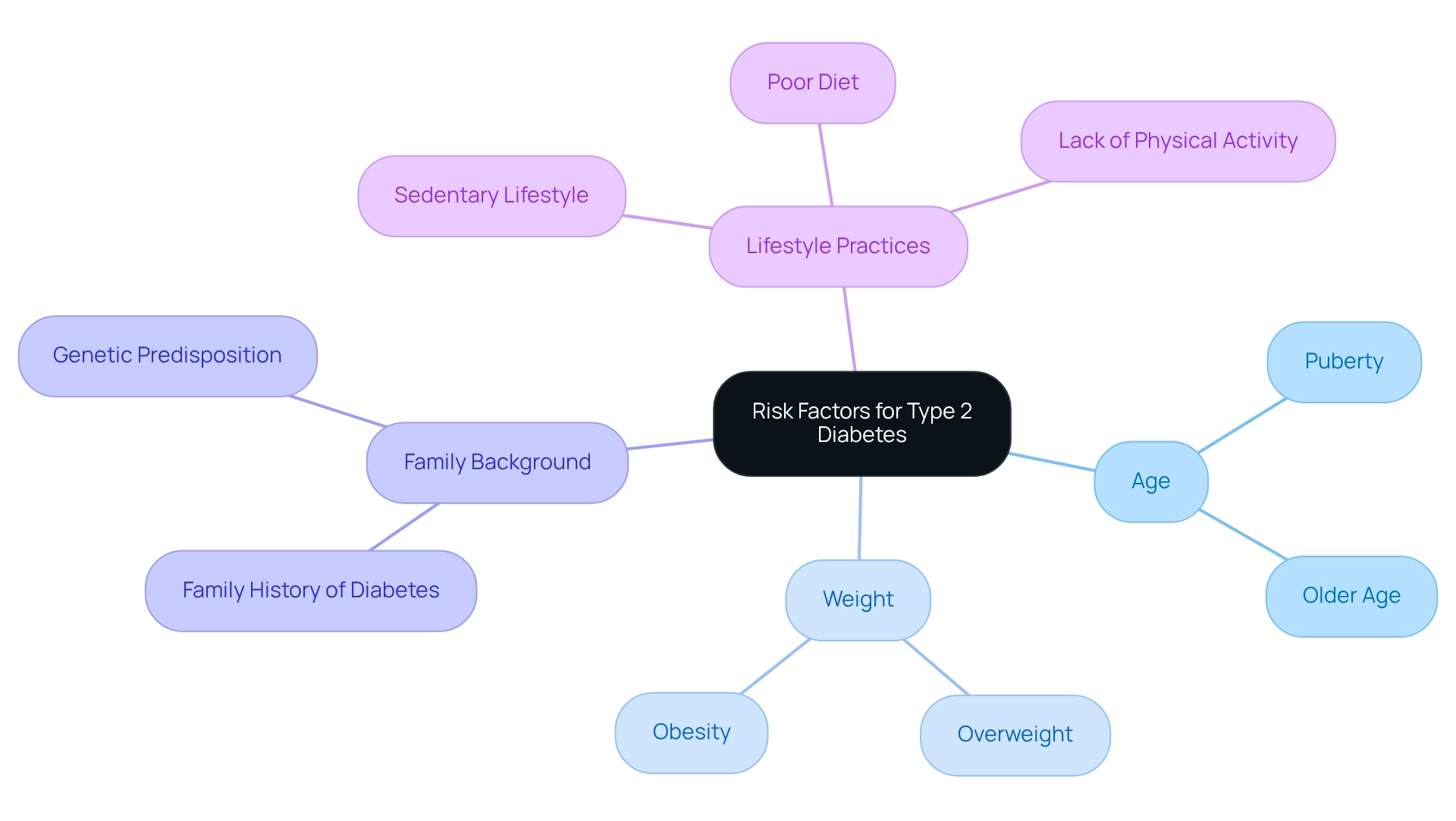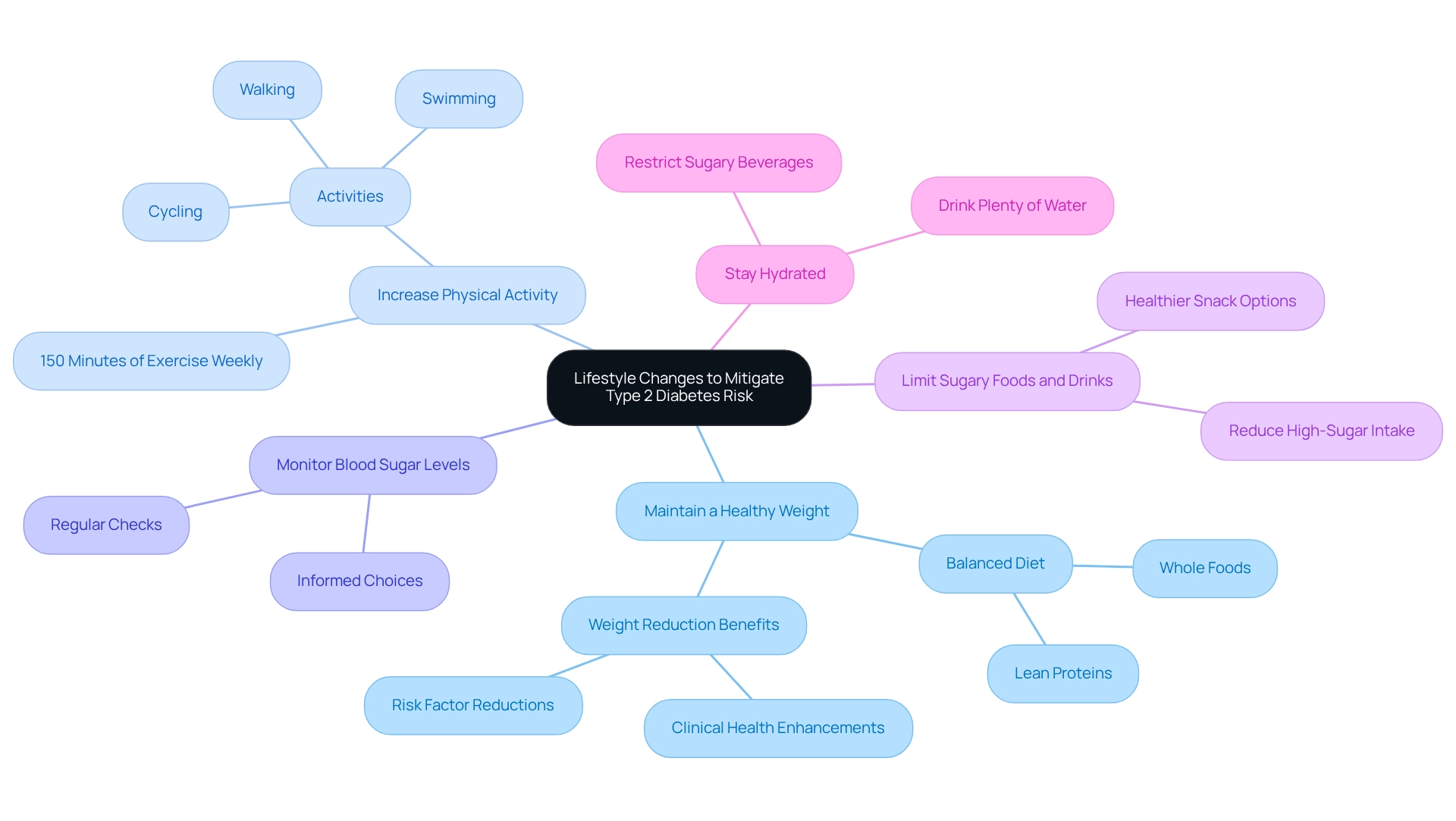Overview
Type 2 diabetes can feel overwhelming, but understanding its causes is the first step toward managing it effectively. This condition often arises from a combination of genetic factors, obesity, physical inactivity, and poor dietary habits, which can lead to insulin resistance and increased blood sugar levels.
It's important to recognize that you're not alone in this journey. Many individuals face similar challenges, and there is hope through effective management strategies. Lifestyle modifications, such as adopting healthier eating habits and increasing physical activity, can make a significant difference. Regular monitoring of your blood sugar levels is also crucial in managing your health.
We urge you to take action by seeking support and resources tailored to your needs. Remember, you are not alone, and there are communities and professionals ready to help you navigate this path. Together, we can mitigate the health risks and complications associated with Type 2 diabetes.
Introduction
The rise of Type 2 Diabetes is a pressing health concern that affects millions of individuals, leading to serious complications if left unmanaged. It's understandable to feel overwhelmed by this chronic condition, characterized by insulin resistance, which not only threatens your physical well-being but also imposes a significant financial burden on you and healthcare systems alike. With alarming statistics indicating that nearly 1 in 10 Americans are affected, it's crucial to understand the risk factors, causes, and effective management strategies available to you.
From making lifestyle changes to undergoing proactive health assessments, this article delves into the multifaceted approach needed to combat Type 2 Diabetes. We aim to empower you on your journey toward better health, reassuring you that you're not alone in this journey. Together, we can explore the resources and support that are here for you every step of the way.
Define Type 2 Diabetes and Its Impact on Health
Living with Type 2 Diabetes is a long-lasting challenge characterized by insulin resistance, which means the body struggles to use insulin effectively. This can lead to increased blood sugar levels, posing significant health risks and serious complications such as:
- Heart disease
- Kidney failure
- Nerve damage
- Vision problems
In 2025, individuals diagnosed with this condition are expected to face medical expenses that are 2.6 times greater than those without it, even after accounting for age and gender differences. This statistic highlights the financial strain that can accompany managing the illness and its complications.
The occurrence of complications from unmanaged Type 2 Diabetes is concerning. Many patients may face a range of health issues, including cardiovascular diseases, which are among the leading causes of death in this population. Recent studies show that nearly 50% of individuals with Type 2 Diabetes may develop some form of neuropathy, while approximately 28% of patients are affected by diabetic retinopathy. These figures underscore the urgent need for effective management strategies.
Understanding these health impacts is crucial for anyone newly diagnosed with Type 2 Diabetes. It’s important to adopt proactive management strategies, including:
- Lifestyle modifications
- Regular monitoring of blood sugar levels
- Adherence to prescribed treatments
By recognizing potential complications and their implications, you can take informed steps toward maintaining your health and preventing disease progression. Furthermore, addressing the emotional and psychological aspects of managing this condition is essential, as it significantly influences your overall well-being.
At T2DSolutions, we are here to provide valuable resources and support for newly diagnosed patients, helping you navigate your journey toward effective diabetes management. Remember, you're not alone in this journey; we are here to support you every step of the way.

Explore the Key Causes of Type 2 Diabetes
Form 2 of the condition arises from a blend of hereditary and lifestyle factors, with obesity being a significant contributor. Recent research explains how type 2 diabetes is caused by a strong link between increasing obesity rates and the rising prevalence of this condition, largely due to sedentary lifestyles and poor dietary choices. The occurrence of this condition has surged in recent years, underscoring the urgent need to address these challenges. Excess body fat, particularly around the abdomen, contributes to insulin resistance, which is a key factor in how type 2 diabetes is caused.
Genetic predisposition plays a vital role as well; individuals with a family history of diabetes face a heightened risk. Studies indicate that certain ethnic communities, including African Americans, Hispanics, and Native Americans, are more susceptible to developing Type 2 Diabetes. This highlights the importance of recognizing one’s heritage when assessing vulnerability.
As we age, the risk of developing health issues, including Type 2 Diabetes, increases. Tom Hanks has expressed that health problems often become inevitable as we grow older, emphasizing the importance of proactive health maintenance. This perspective aligns with professional insights suggesting that managing weight through lifestyle changes can significantly reduce the likelihood of developing this condition.
Real-life examples illustrate the impact of obesity on the risk of glucose intolerance. For example, many individuals who have successfully lost weight often report improvements in their blood sugar levels and overall health. This reinforces the crucial role of addressing obesity in diabetes prevention and management.
In summary, understanding how type 2 diabetes is caused involves considering genetic factors, obesity, physical inactivity, and poor dietary habits. By understanding these contributing elements, individuals can take informed steps to manage their health and lower their chances of developing this chronic condition. As Peter M. House wisely stated, "This condition is not a burden, but a lesson in perseverance and self-care," reminding us that managing this illness is a journey that requires resilience and informed decision-making. Furthermore, T2DSolutions collaborates with experts, researchers, and advocacy groups to ensure that the information shared is accurate and relevant, empowering you to make informed decisions about your health. Remember, you're not alone in this journey; we are here to support you every step of the way.

Assess Your Risk Factors for Type 2 Diabetes
Evaluating your likelihood for how type 2 diabetes is caused involves examining several important factors, including age, weight, family background, and lifestyle practices. At T2DSolutions, we serve as a vital resource center for education and management related to blood sugar conditions. We provide tools like the Risk Test to help you assess your risk level. This test highlights key indicators such as being overweight, leading a sedentary lifestyle, and having a family history of blood sugar issues, which are crucial for understanding how type 2 diabetes is caused.
It's concerning to note that recent statistics show this condition affects approximately 1 in 10 Americans, underscoring the importance of awareness and proactive management. The economic consequences are significant as well, with additional medical expenses per individual rising from $10,179 in 2012 to $12,022 in 2022. This emphasizes the need for efficient risk evaluation and support.
Routine examinations with healthcare professionals are crucial for early identification and intervention, which are vital for successful management of the condition. It's understandable to feel overwhelmed by the increasing occurrence of Diabetes 2, particularly among non-Hispanic Black children and teenagers, who have shown the highest rates from 2002 to 2018. According to the Centers for Disease Control and Prevention (CDC), this form of sugar metabolism disorder is rising around the time of puberty across all ethnic groups, demonstrating how type 2 diabetes is caused. This trend highlights the necessity for early intervention and education to reduce long-term health issues.
Healthcare providers advocate for the use of assessment tools, as they can offer valuable insights into personal factors. For instance, a case study on trends in blood sugar conditions among young people revealed significant rises in both type 1 and type 2 disorders, particularly among non-Hispanic Asian or Pacific Islander youth. This emphasizes the need for focused education and preventive actions.
By utilizing the assessment available through T2DSolutions and participating in regular health evaluations, you can gain a clearer understanding of your susceptibility factors for this condition. Remember, you’re not alone in this journey; taking proactive measures towards managing your health efficiently is a step in the right direction.

Implement Lifestyle Changes to Mitigate Risk
To effectively lower the chances of Type 2 diabetes, consider adopting the following lifestyle modifications:
-
Maintain a Healthy Weight: It's important to focus on a balanced diet that includes whole foods such as fruits, vegetables, whole grains, and lean proteins. Sustaining a healthy weight is essential. Research shows that 8.0% of U.S. adults with diagnosed diabetes had a non-HDL level of 190 mg/dL or above, which is associated with an increased likelihood of cardiovascular disease. Even minor levels of consistent weight reduction can lead to clinical health enhancements and reductions in risk factors, as observed by Kevin D. Hall from the National Institute of Digestive & Kidney Diseases.
-
Increase Physical Activity: Aim for at least 150 minutes of moderate exercise each week. Activities such as walking, cycling, or swimming not only assist in weight control but also improve insulin sensitivity, lowering the chance of diabetes. Remember, every step counts toward a healthier you.
-
Monitor Blood Sugar Levels: Regularly checking your blood sugar levels can provide valuable insights into your health. This practice helps you understand how your body responds to different foods and activities, allowing you to make informed dietary and lifestyle choices.
-
Limit Sugary Foods and Drinks: Reducing the intake of high-sugar foods and beverages is crucial, as these can lead to spikes in blood sugar levels. Instead, consider opting for healthier snacks and drinks to maintain stable glucose levels. It's understandable to crave sweet treats, but making mindful choices can significantly benefit your health.
-
Stay Hydrated: Drinking plenty of water is vital for overall health. By restricting sugary beverages, you can not only assist in sustaining a healthy weight but also decrease the risk of diabetes-related conditions. Staying hydrated is a simple yet powerful way to support your body.
Adopting these modifications can greatly diminish your chances of developing Type 2 diabetes complications and improve your overall health. Real-world examples show that individuals who engage in structured weight management programs, including referrals to dietitians and community resources, often achieve better outcomes in diabetes prevention. Remember, you're not alone in this journey. By taking proactive steps toward a healthier future, you can make a significant difference in your life.

Conclusion
Understanding Type 2 Diabetes and its implications is vital for anyone navigating this chronic condition. It's understandable to feel overwhelmed by the serious health risks associated with unmanaged diabetes, including heart disease and nerve damage. Additionally, the substantial financial burden it places on individuals and healthcare systems cannot be overlooked. Proactive management, including lifestyle changes and regular health assessments, emerges as a critical strategy to mitigate these risks and improve overall health.
The causes of Type 2 Diabetes are multifaceted, with obesity, genetics, and lifestyle choices playing significant roles. By recognizing these factors, you can take informed steps to reduce your risk. The importance of assessing personal risk factors through tools like the Diabetes Risk Test is emphasized, as early detection and intervention are crucial in preventing the progression of diabetes.
Implementing lifestyle changes such as maintaining a healthy weight, increasing physical activity, and monitoring blood sugar levels can dramatically lower your risk of developing Type 2 Diabetes. These proactive measures not only improve health outcomes but also empower you to take control of your well-being. The journey toward effective diabetes management is one of resilience and informed decision-making. Remember, you are not alone in this journey; support and resources are available to you. By embracing these strategies, you can navigate your path to better health and a brighter future.
Frequently Asked Questions
What is Type 2 Diabetes and what challenges does it present?
Type 2 Diabetes is a long-lasting condition characterized by insulin resistance, where the body struggles to use insulin effectively. This can lead to increased blood sugar levels and significant health risks, including complications such as heart disease, kidney failure, nerve damage, and vision problems.
What are the expected medical expenses for individuals with Type 2 Diabetes in 2025?
In 2025, individuals diagnosed with Type 2 Diabetes are expected to face medical expenses that are 2.6 times greater than those without the condition, even after accounting for age and gender differences.
What are some common complications associated with unmanaged Type 2 Diabetes?
Common complications include cardiovascular diseases, neuropathy (affecting nearly 50% of individuals), and diabetic retinopathy (affecting approximately 28% of patients).
What proactive management strategies can individuals with Type 2 Diabetes adopt?
Proactive management strategies include lifestyle modifications, regular monitoring of blood sugar levels, and adherence to prescribed treatments.
Why is it important to address the emotional and psychological aspects of managing Type 2 Diabetes?
Addressing the emotional and psychological aspects is essential because they significantly influence overall well-being and can impact the effectiveness of diabetes management.
What resources does T2DSolutions offer for newly diagnosed patients?
T2DSolutions provides valuable resources and support to help newly diagnosed patients navigate their journey toward effective diabetes management, emphasizing that they are not alone in this process.



